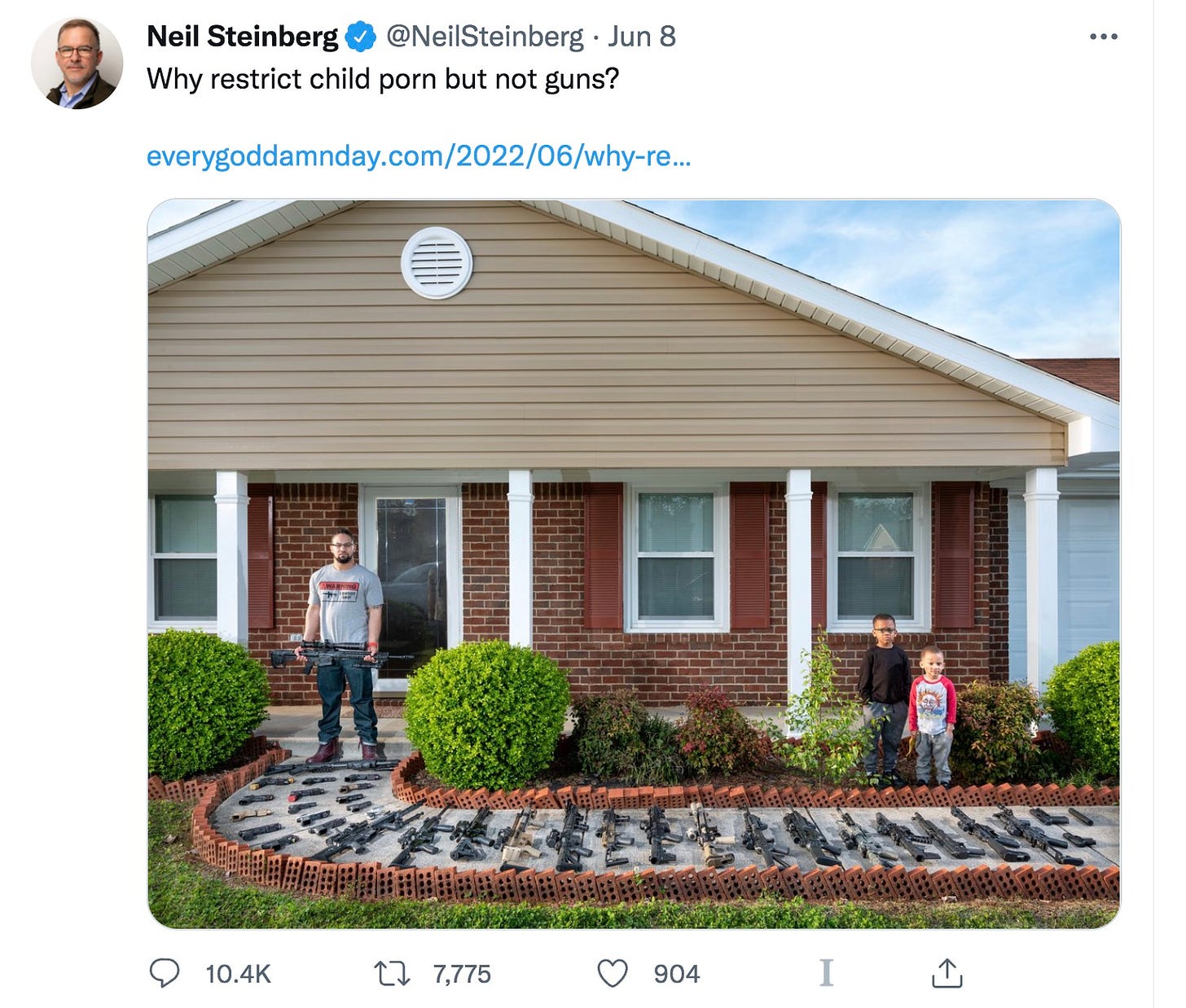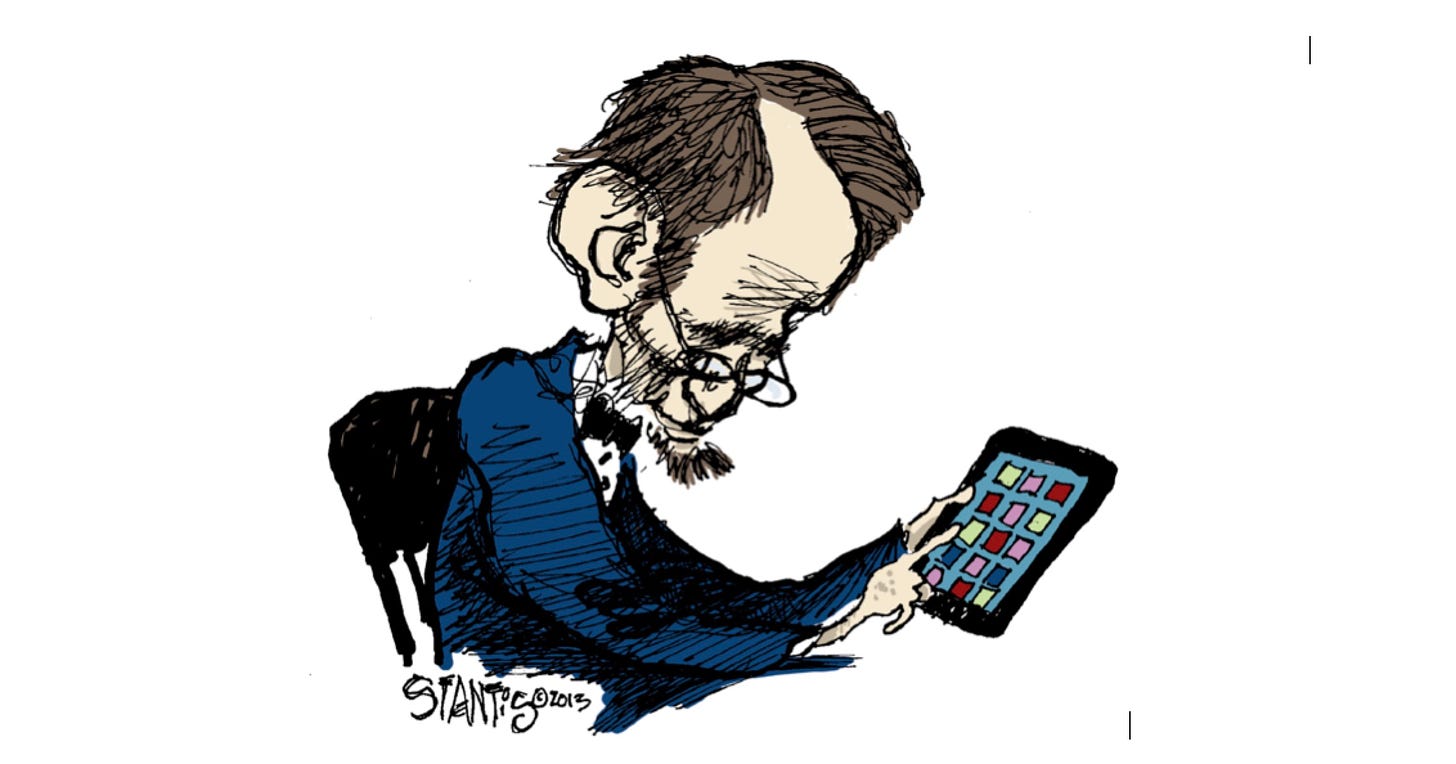6-16-2022 (issue No. 40)
This issue exceeds in size the maximum length for a standard email. To read the entire issue in your browser, click on the headline link above.
A better choice
Seventeen Democrats will be on the June 28th primary ballot in Illinois’ 1st Congressional District, meaning that, theoretically, 6% of the vote could win the nomination. And, far more likely but only slightly less troubling, a candidate with less than 20% support could win.
After all, in the February, 2019 Chicago mayoral primary, there were only 14 candidates and Lori Lightfoot was the top vote getter with just 17.5% support. She then faced a run-off election with the second-place finisher — Cook County Board President Toni Preckwinkle, who’d won16% of the vote — just as the Democratic victor June 28th will face a Republican challenger on Nov. 8.
But given Democratic dominance in the district — Rush has won more than 70% of the congressional vote in every election since 1992 — the reality is that the primary winner will go to Washington next year.
But elections, including and especially primaries, ought to be about measuring the will of the majority.
So once again I am making the case for ranked-choice voting in multicandidate races. In such a system, voters are asked to rank all the contenders in order of preference, first, second, third and so on.
If no candidate gets a majority of first-choice votes, the last-place candidate is eliminated and the second-choice votes of his or her supporters are added to the others' totals. This process repeats until one of the candidates breaks the 50 percent barrier.
This system eliminates the effect of so-called spoiler candidates who siphon off support from candidates whose views are actually more popular among the electorate.
It stands to encourage voters to come to the polls even if they don’t think their first choice has a chance. It prompts them to play closer attention to the entire field of candidates. It eliminates the expense of run-off elections where those are held. And backers say it has a moderating effect on our politics because candidates seeking second and even third-choice votes will be reluctant to engage in rank, ugly negative campaigning.
FairVote, the main organization pushing ranked-choice voting, reports:
As of June 2022, 55 cities, counties, and states are projected to use RCV for all voters in their next election. These jurisdictions are home to approximately 10 million voters, and include 2 states, 1 county, and 52 cities. Military and overseas voters cast RCV ballots in federal runoff elections in 6 states.
Admittedly, this “better way” isn’t perfect. Opponents argue that anything more elaborate than “check one” can confuse voters, inspire excessive pandering by candidates, break down party discipline and hinder the hopes of strong minority candidates in certain situations. (RCV would likely have denied Harold Washington his landmark, 37 percent victory over two white candidates in Chicago's 1983 Democratic mayoral primary, for example).
But plurality rule has its drawbacks as well, as we are likely about to see.
My first choice is to at least give ranked choice voting a try for an election cycle or two. How much more absurd could it possibly be than the idea of 17 Democrats scrapping for a narrow sliver of the vote?
Here is my 2009 FAQ/webliography on RCV.
Last week’s winning tweet
Scroll down to read this week’s nominees or click here to vote in the new poll.
Focus on ‘the ratio’ is one reason why Twitter is such a septic tank
The site Data for Progress offers this definition of “the ratio” on Twitter:
One simple, popular way to measure the quality of a tweet is its ratio -- the number of replies divided by the number of likes it receives. The reasoning behind this is that it takes far more effort to write out a response to a tweet than to simply smash that like button and keep scrolling. While not all replies to a tweet are necessarily negative, the more people take the time out of their day to respond to a tweet, the better an indication it is that a lot of people find it objectionable.
There is truth in this observation. Most comments are negative — in fact many “comments” aren’t comments at all but snarky GIFs or insulting images or screen grabs, at least 90% of which are from people hiding behind pseudonymous screen names. Some are just profane sentence fragments. “Comments” aren’t critiques or counterpoints so much as middle-finger style workarounds for the fact that Twitter doesn’t yet have a “dislike” button (there are some rare, experimental exceptions).
In fact, some of the hostile comments are simply gleeful, self-congratulatory mentions of the ratio itself, illustrating only that Twitter is a terrible place for a thoughtful exchange of ideas and that the comment count under each tweet simply encourages derogatory responses from an excitable mob.
Twitter could discourage these sorts of pile-ons by hiding comment counts and displaying only the number of “likes” a tweet has, but evidently its data nerds have decided that anonymous toxicity enhances the brand.
On Facebook, where thoughtful exchanges are possible in part because comments can be lengthy and in part because it’s easy to reply to certain comments within the thread, you never hear giddy talk from haters about “ratios” because the number of comments on a post almost always indicates that others have found it engaging, not objectionable.
I read and care about comments from people whom I follow only. If I don’t follow you, I’m not notified of your comments and I don’t dive deep to read what you have to say, because experience has taught me that you’re likely hoping to sound a Bronx cheer, and that those who are hyperactive on Twitter aren’t necessarily representative of the real world.
When I’d be ratioed (some write “ratio’d”) on Twitter back in my Tribune days, email and Facebook responses were far, far more balanced, positive and interesting.
Sun-Times columnist Neil Steinberg was ratioed last week:
Well over 10,000 comments against fewer than 1,000 likes. But it was obvious to anyone who read the column and then peeked into the sewer of comments that most of those reacting with dismay and ad hominem contempt had not read or understood Steinberg’s argument, which was that First Amendment speech protections remain healthy and robust despite prohibitions on child pornography, so the Second Amendment protections ought not be threatened by certain limitations on gun rights designed to minimize harm to children.
Those who seemingly had read and understood the column offered nothing remotely thoughtful or interesting in the Twitter comments. I stopped scrolling after about 200 shit posts, so I could have missed something relevant, but it’s hard to imagine anyone reading more comments than that before getting bored; the 10,000th commenter was simply talking to himself and no doubt typing only to contribute to the ratio.
The fact that numerous commenters were gloating about the ratio made the overall response less impressive still. In a follow up Steinberg posted that he hadn’t read any of the comments — “Happy is he," Kierkegaard said, "who didn't have to go to hell to know what the devil looks like.” — which of course got him ratioed again, because it’s Twitter:

News & Views
News: Latest polling shows downstate Ill. Sen. Darren Bailey nearly lapping the field in the June 28 Republican gubernatorial primary.
View: Unless these polls are flukes, this race is over.
Bailey is in first place in the six-candidate field with 32% support according to a WBEZ/Sun-Times poll taken last week. In second place with just 17% is Aurora Mayor Richard Irvin, who held a narrow lead in a poll taken in early May
Bailey holds a similarly commanding lead, 38% to 20%, in a Trafalgar Group poll taken June 10-13.
The other four candidates combined have 23% support in the WBEZ/Sun-Times poll and 26% in the Trafalgar poll.
I consider it unlikely that a strong percentage of the undecideds — 27% in WBEZ/Sun-Times, 16% in Trafalgar — will end up voting for Irvin given that they have evidently yet to be swayed by his relentless TV advertising.
And there’s now a better chance that President Donald Trump, whose endorsement has been shown to carry weight with Republican primary voters, will put his thumb on the scale for Bailey, quite possibly during a June 25 political rally at the Adams County Fairgrounds near Quincy, Illinois.
Irvin, seeming to be angling for support from moderates in the general election, has kept his distance from Trump, and Trump is known to offer endorsements only to those he thinks will be winners.
But it’s hard to imagine Bailey or, really, anyone in the Republican field beating incumbent Democratic Gov. J.B. Pritzker in November.
News: New York Democratic Rep. Ritchie Torres blasts use of the term “Latinx.”
View: I’m all about using preferred, respectful terminology, but Torres is onto something.
“Never heard anyone locally use the term ‘Latinx.’ Does a majority of Hispanics actually use the term ‘Latinx’?” he tweeted. “If the answer is ‘no’, how did ‘Latinx’ come to be the term to use in government and Corporate America? … If you are referring to the Hispanic community in general, why not use the term that the majority itself predominantly uses?”
That term is “Hispanic,” according to a New York Post story:
In November, a Bendizen and Amandi International survey found that only 2% of Hispanic voters refer to themselves as “Latinx.” The poll found that the majority – 68% – described themselves as “Hispanic” while 21% used the terms “Latino” or “Latina.” …
Another poll, done by Gallup last summer, found that only 4% of Hispanic adults preferred “Latinx” for a label, 15% liked “Latino,” 23% preferred “Hispanic,” and the majority – 57% – said they had no preference.
The term “Latine” is also in the conversation. So let’s revive this conversation when the pro-Latinx coalition breaks the 20% barrier.
News: Internal Documents Show Amazon's Dystopian System for Tracking Workers Every Minute of Their Shifts.
View: Given how easy technology makes this sort of monitoring, I’m surprised anyone finds this surprising. From Vice:
Amazon tracks and records every minute of "time off task" (which it calls TOT) with radio-frequency handheld scanners that warehouse associates use to track customer packages. … (The company tracks) down to the minute, the amount of time individual workers spent in the bathroom and infractions such as "talking to another Amazon associate," (and) going to the wrong floor of a warehouse. …
Amazon explains the purpose of its TOT policy to associates, saying workers’ “commitment to completing assigned tasks is critical in order to be Earth's most customer-centric company.”
Tracking employee whereabouts during work hours isn’t an inherently horrible idea, though it does seem that other performance metrics could measure the activity (or lack thereof) of warehouse workers without counting the seconds they’re in the bathroom.
News: San Francisco District Attorney Chesa Boudin recalled by voters in a landslide.
View: One of my more unpopular opinions is that I don’t believe in recall elections. The time to get rid of underperforming pols, like the time to impose term limits, is Election Day, which comes around often enough to address unpopular acts, broken promises and the like.
Legislative bodies should have broad impeachment powers when criminal conduct has been plausibly alleged and felony criminal indictments should result in immediate removal from office, but recall is a disruptive remedy that would discourage brave or risk-taking behavior by politicians.
If voters in Wyoming had the ability to recall Republican U.S. Rep. Liz Cheney — which they do not — I suspect they would have by now, given the fallen state of the cultish Republican Party.
Land of Linkin’
This video clip is from early May but I just came across it. Best thing I saw all week:
“Is it art or artificial intelligence?” University of Washington computer scientist Aaron Hertzman writes about his experiments with a test/beta version of DALL-E 2, “a new neural network algorithm that creates a picture from a short phrase or sentence that you provide. … The program creates six brand-new images, each of which reflect some version of the entered phrase. … For example, when some friends and I gave DALL-E 2 the text prompt “cats in devo hats,” it produced 10 images that came in different styles. Nearly all of them could plausibly pass for professional photographs or drawings.”
“Herpes Scare” featuring Paul Giamatti as God was one of the best sketches in the brilliant sketch show “Inside Amy Schumer” (2013-2016)
“Twinzer Dad” has an amusing Twitter thread, “If You Take a Mom to Target,” that begins: “If you take a Mom to Target, she’ll probably see a cute decorative basket in the dollar section that she likes. Picking out that basket will remind her that she needs a bunch of stuff to put in it. …” Parents who remember reading “If You Give a Mouse a Cookie” a thousand times to their kids will know just how it goes from there.
“Why the return to the office isn’t working” in Vox/Recode: “Those who want to (work remotely) are upset because they enjoyed working from home and don’t understand why, after two years of doing good work there, they have to return to the office. People who couldn’t wait to go back are not finding the same situation they enjoyed before the pandemic, with empty offices and fewer amenities. … People go into the office to see other people but then don’t actually see those people so they stop going into the office as much. … It’s important to remember that going to the office never really worked for everyone, it was just what everyone did.”
The Picayune Sentinel on the air: On Thursdays at 4:30 p.m., WCPT-AM 820 host Joan Esposito and I chat about ideas raised in the new issue. This week, guest-host Hal Sparks will lead the conversation, and I plan to remind him of the connection my wife and I have to his early career success. The listen-live link is here.
The Picayune Sentinel preview: Mondays at 11:30 a.m. I talk with WGN-AM 720 host John Williams about what’s making news and likely to be grist for the PS mill. The WGN listen-live link is here.
Minced Words
I’ve been traveling this week and so wasn’t available to appear on this week’s episode of the award-winning “Mincing Rascals” podcast, but the WGN-AM website describes it this way:
John (Williams), Heather (Cherone) and Austin (Berg) talk about the GOP race for governor and the latest polling showing State Senator Darren Bailey with a commanding lead over Aurora Mayor Richard Irvin; the arguments made for ranked-choice voting; the latest on the January 6th hearings; Caterpillar announcing they would be moving their HQ from Illinois to Texas; more candidates lining up to take on Mayor Lori Lightfoot; and the effort to pass a proposal to overhaul Chicago’s ethics rules
Subscribe to us wherever you get your podcasts. Or bookmark this page. If you’re not a podcast listener, you can now hear an edited version of the show at 8 p.m. most Saturday evenings on WGN-AM 720.
Mary Schmich: Clearing Out The Closet, an ongoing saga
My former colleague Mary Schmich posts column-like thoughts most Tuesdays on Facebook. Here is this week’s offering:
Q. If you won a $25 U.S. Savings Bond in a high school contest in 1971 and found it in a closet 51 years later, and if you decided it was time, here in 2022, to cash it, and if you walked it over to the bank and said, “Can you cash this?” and if the 25-year-old bank clerk said, “I don’t know,” how much money would you come home with?
A. I’ll reveal the answer in a moment.
But first, a few more thoughts on clearing out the closet where I’ve stored a lifetime of papers.
Until I settled into a condo in Chicago in 1992, I’d moved a lot—16 times?—after the age of 9. In all that coming and going, I didn’t hold on to many objects—but I did hang on to papers. Letters, journals, assorted mementoes from grade school, high school, college. Medical records, tax returns, bank statements. I’m not quite sure why I kept it all. Some kind of proof of life?
Almost all these papers are crammed into a closet in my guest room. I rarely look at them but sometimes I’ve felt all that paper as a weight, the physical pressure of the past, and suddenly I had the urge to purge.
It’s a common urge at this age. When I’ve mentioned my closet-clearing project to friends of my vintage most of them say, “I’ve been doing that too” or “I really need to do that.” No one wants to say the word “die” but somewhere in the closet-clearing mania is a recognition that sooner or later, we’re gonna slip this mortal coil and it would be better to get rid of the worthless or embarrassing papers n-o-w.
I remember some of what I’ve found in the closet. A lot of it startles me.
I was startled by the photo (above) of me and all my siblings, with our mother, on some porch stairs in Laramie, Wyoming, where my brother Bill had just gotten married.
Startled by the 1992 document that reminded me of my mortgage rate when I bought my place. 8.9%. Crazy!
Speaking of crazy, there was the letter to me and my friend Diana from a Commandant Jacques Dore. We were on our semester abroad in France and we’d applied to be cooks on a yacht. I wrote a column about that adventure once—but had no idea I still had the letter from Commandant Dore bidding us to an interview at the Grand Hotel in Paris. We got the job.
So many letters in the closet. Hundreds of letters from the days when people expressed themselves in excruciating, handwritten length on paper. What do you do with other people’s letters, especially the ones with very private musings? Get rid of them? Offer to return them?
Sometimes I don’t recognize myself in all this paper, barely recognize my own musings: Did I write that poem, that song, that journal entry? Who was that person? Who is that person?
All this paper proof of life has stirred up too many feelings to chronicle here, but, in short, each document feels like a piece of a jigsaw puzzle, the jigsaw puzzle of a life.
Maybe that’s why we need to clear out our closets—to remember the past, to piece it together, to let go of whatever isn't retained by the leaky sieve of the mind.
Coincidentally, a couple of days ago, I picked up one of my favorite novels, “This Is Happiness” by Niall Williams, and leafed through. I came across a passage I’d marked when I read it a couple of years back and it seemed even more astute now. Here’s what it said:
“Maybe I didn’t know it then, I’m pretty sure I didn’t. Didn’t know that there are times in a life that pass but retain a gleaming, which means they never die, and the light of them is in you still. There are many consolations in having a convulsed heart. Among them is being attuned to the music of every day and awake to all that is shining, stirring, pulsing.”
As for that $25 savings bond from 1971, the young bank clerk said it was the oldest one she’d ever seen. It yielded $107.85 in interest. Excavating the past pays. — Mary Schmich
Hey, do you want your old letters back?
A passage in Mary Schmich’s post, above, resonated with me:
What do you do with other people’s letters, especially the ones with very private musings? Get rid of them? Offer to return them?
I’m in the midst of going through my files of old correspondence and have decided to try to contact the old acquaintances whose pre-email epistles fill several boxes. Most of the letters are from the 1980s and my thought is that they might well be of interest to those who wrote them. “Would you like these back?”
Unacknowledged is the possibly insulting truth that I no longer want them — that I’m extremely unlikely ever to read these letters again and extremely likely to toss them into the recycling before very long.
Some have said yes. Some have said no thanks. Others have simply not responded. But it’s a small sample size so far. So here is my question for the commentariat.
If an old acquaintance offered to return all the old letters of yours in their possession, would you feel offended? Intrigued? Indifferent?
Re: Tweets
This week’s nominees for Tweet of the Week:
Please stop putting your skin in the game. It's super gross — @prufrockluvsong
I’m no psychic but I’m fairly certain that I’m destined to die of an aneurysm while screaming “REPRESENTATIVE!” into my phone —
@UncleDuke1969
Me Struggling to get the lid off: Once I get this jar of Whip-Your-Butt open, you ‘d better run! Him: “Whip-Your-Butt”? Me: It’s generic. — @Cornjerker78
[porn director pulls me aside] “You gotta quit saying ‘golly.’" — @CornOnTheGoblin
I really need my therapist to stop responding to my anxiety and depression with “makes sense.” — @kariassad
Do you understand how much stuff had to go wrong for responsibility to fall to Matthew McConaughey? — @lolennui
There's probably some kind of club where dudes go to fight, but no one will tell me about it. — @IamJackBoot
Excuse me, Pink Floyd. It's "We don't need ANY education."— @GianDoh
I’m in that sweet, carefree stage of life right before an intervention. — @badbanana
Adding ‘Skip Intro’ to the list of pseudonyms I’d consider changing my name to. — @John_M15
Last week’s issue has the list of nominated political tweets and notes the winner.
Click here to vote in the poll. For instructions and guidelines regarding the poll, click here.
Today’s Tune
The 1988 song “Another Train” by British roots musician Pete Morton is a stirring antidote to the disappointments that life deals out:
There's another train. There always is. Maybe the next one is yours. Get up and climb aboard Another train.
The tempo isn’t bouncy or upbeat, but the song is quietly, forcefully inspirational. You will find there are times when it’s just the song you need to hear.
(Here is the song as it appears on Morton’s album “One Big Joke.” The Poozies have a beautiful version. The full lyrics and chords are here.)
Consult the complete archive of my featured tunes!
The Picayune Sentinel is a reader-supported publication. Simply subscribe to receive new posts each Thursday. To support my work, receive bonus issues on Tuesdays and join the zesty commenting community, become a paid subscriber. Thanks for reading!
.

















Among the drawbacks of ranked choice voting was that it might “break down party discipline.” I think I’d put that one on the other side of the ledger.
Love your columns thank you